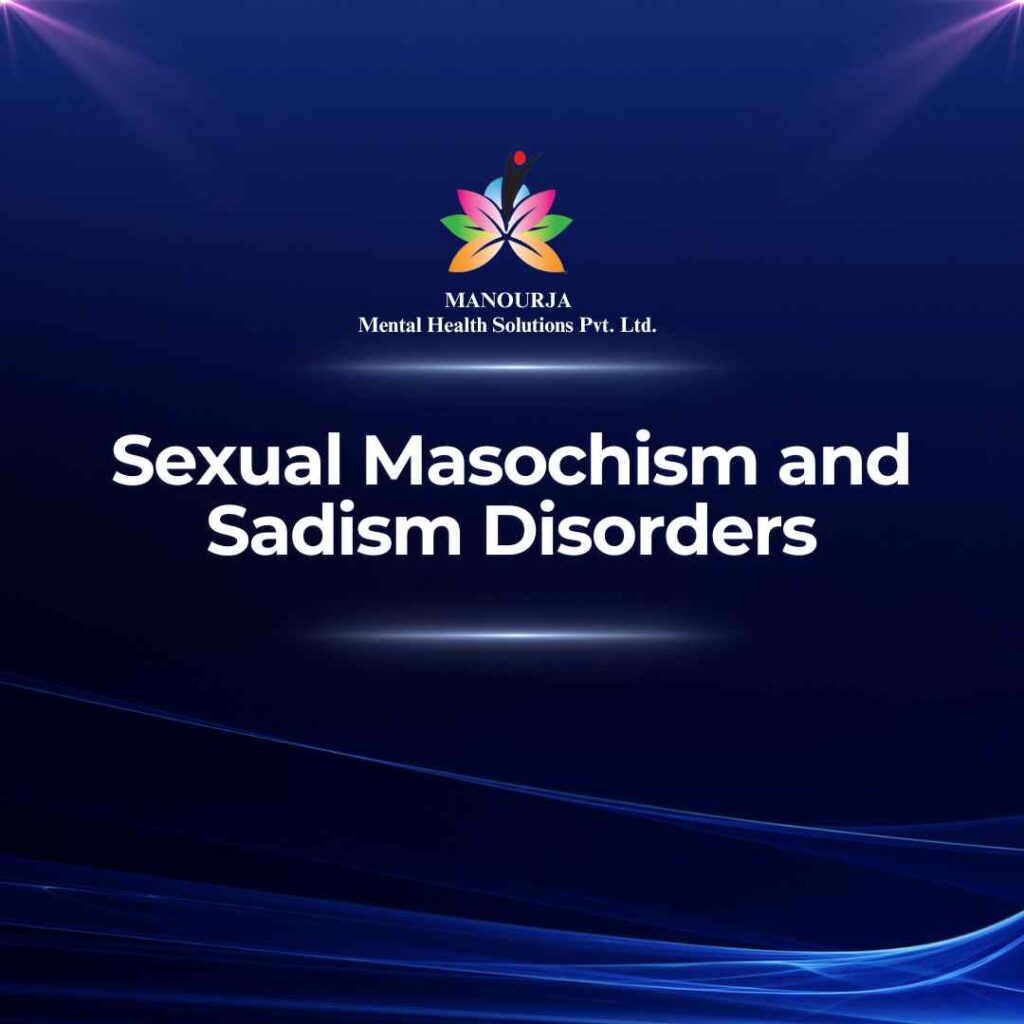Sexual Masochism and Sadism Disorders

Sexual Masochism and Sadism Disorders are classified under paraphilic disorders, where sexual arousal and gratification are dependent on suffering physical pain and humiliation (masochism) or inflicting pain on others (sadism). These conditions go beyond consensual kinky practices found in activities like BDSM (Bondage, Discipline, Sadism, and Masochism), which are characterized by mutual consent and respect for boundaries. The disorders are diagnosed when these behaviors cause significant distress to the individual or involve non-consensual partners.
Symptoms of Sexual Masochism Disorder
- Pain and Humiliation: Individuals derive sexual pleasure from being humiliated, beaten, bound, or otherwise made to suffer.
- Compulsion and Distress: The urges or fantasies cause significant distress or impairment in social, occupational, or other important areas of functioning.
- Consent and Safety Concerns: Unlike BDSM, which prioritizes consent and mutual satisfaction, sexual masochism disorder may lead individuals to engage in harmful behaviors that could endanger their health or well-being.
Symptoms of Sexual Sadism Disorder
- Inflicting Pain: Individuals experience sexual arousal through the physical or psychological suffering of another person.
- Non-consenting Partners: The key aspect that delineates sadistic behavior as a disorder is the involvement of non-consenting individuals, which can lead to criminal behavior.
- Distress and Dysfunction: The condition causes significant distress or impairment, or involves actions that harm others and have legal ramifications.
Forms of Sexual Masochism and Sadism Disorders
Both disorders can vary in their manifestation:
- Mild to Severe: The intensity of the desires can range from mild fantasies to compulsive behaviors.
- Situational vs. Generalized: In some cases, these behaviors may occur only in specific situations or with certain partners, while in others, they are pervasive and occur across all sexual activities.
Treatment of Sexual Masochism and Sadism Disorders
Treatment focuses on reducing distressing symptoms, improving interpersonal functioning, and ensuring behaviors are consensual and safe. Here are common approaches:
Psychotherapy
- Cognitive Behavioral Therapy (CBT): Helps individuals recognize and modify problematic behaviors and thoughts. For sadism, it may focus on impulse control and empathy training.
- Psychodynamic Therapy: May explore underlying emotional conflicts and past experiences that contribute to the disorders.
Medication
- SSRIs (Selective Serotonin Reuptake Inhibitors): These can help manage symptoms, particularly compulsions, by reducing overall drive.
- Anti-androgens: These medications reduce sexual drive and may be used in severe cases where there is a risk of harm to oneself or others.
- Support Groups: These can provide a community where individuals can share experiences and coping strategies under professional supervision.
- Therapeutic Groups: Facilitated by a therapist, these groups can help participants learn from others’ experiences in a controlled environment.
Legal and Ethical Considerations
- Informed Consent: Treatment for these disorders also involves discussing and ensuring all sexual activities are consensual, highlighting the importance of respect and boundaries.
- Legal Counseling: May be necessary, particularly for individuals with sexual sadism disorder who have engaged in non-consensual behaviors.
Harm Reduction
- Safety Planning: For those involved in BDSM activities, education around safe practices, clear boundaries, and mutual consent is crucial.
- Relapse Prevention: Strategies to recognize triggers and prevent the escalation of unsafe or non-consensual activities.
Managing these disorders requires a nuanced approach that balances addressing the underlying psychological issues, ensuring all behaviors are safe and consensual, and minimizing harm to the individual or others. Therapy and treatment should always be guided by professionals experienced in sexual health and paraphilic disorders.
At MANOURJA, we believe in the transformative power of counseling. Our experienced therapists offer a safe and supportive space where you can explore your thoughts, emotions, and challenges. Through personalized counselling sessions, we’ll work together to develop coping strategies, build resilience, and achieve lasting positive change. Discover the path to a healthier, happier you with MANOURJA counselling services.
MANOURJA Rehabilitation Services
At MANOURJA, we’re dedicated to helping you in rebuild your life, after difficult times. Our rehabilitation services focus on understanding what you need to move forward, whether you’re recovering from addiction, trauma, or any psychological – social challenges. We create personalized plans, that are all about helping you, regain your strength and find hope again. With a caring team by your side, you’ll have the support to make real progress and take steps toward a brighter, healthier future.
